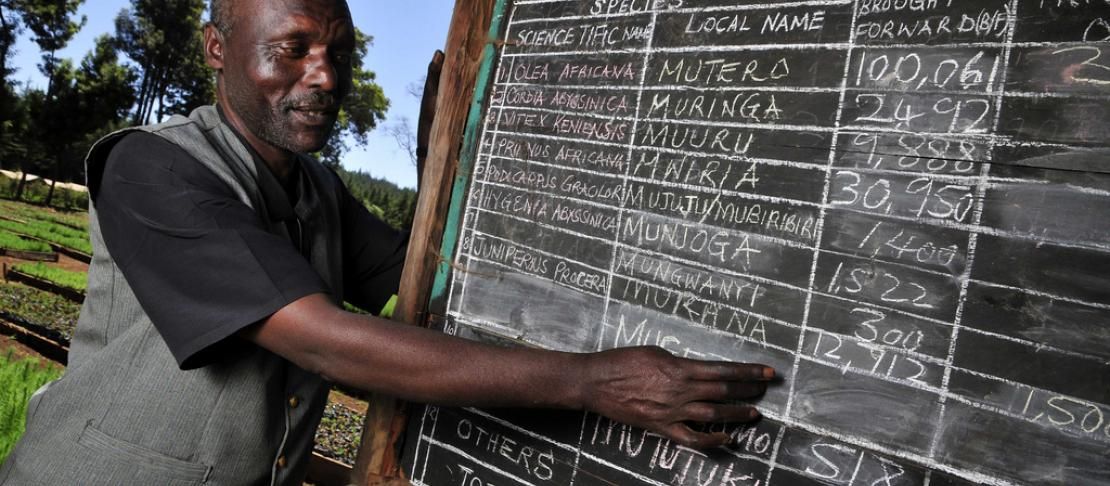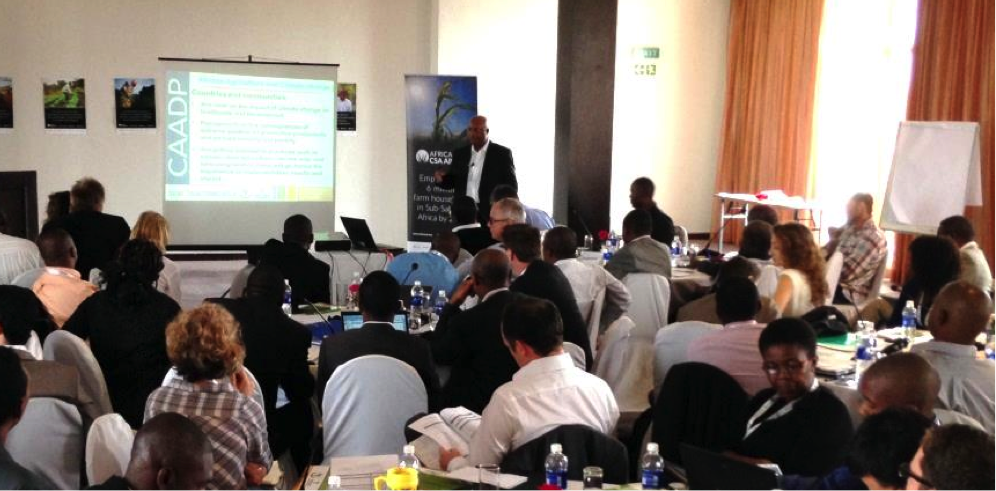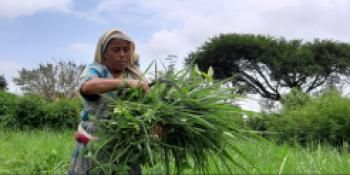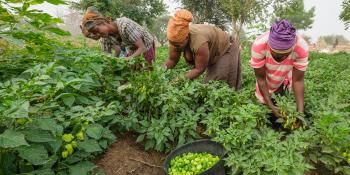The Africa CSA Alliance: path to implementation

One year since its launch, the Alliance makes progress towards improving the lives of 6 million farming households under climate change.
One year since the launch of the Alliance
This time last year, the Africa Climate-Smart Agriculture (CSA) Alliance was launched at a side event during UN Climate Week 2014. Since then, the Alliance transitioned from developing and refining its continental structure, systems and frameworks, to facilitating multi-sectoral in-country engagement and collaboration, and supporting the development of national CSA plans and scaling-up proposals. The resulting country-level partnerships that have formed for CSA implementation reflect the core purpose of the Alliance and the significant progress being made towards its overarching goal of 6 million smallholder farm households practicing CSA by 2021.
In-country partnerships across Africa
The Alliance has so far mobilized in-country partnerships in 8 countries: Ethiopia, Kenya, Madagascar, Malawi, Niger, Tanzania, Uganda, and Zambia. In each of these countries, the Alliance is working collaboratively to support the respective Governments to develop and implement CSA programs within their National Agriculture Investment Plans (NAIPs). To develop these in-country partnerships, regional bodies such as the New Partnership for Africa's Development (NEPAD) and the Common Market for Eastern and Southern Africa (COMESA) have facilitated meetings between country focal points from each of the Alliance steering committee organisations and the respective National Governments. Discussions are underway with the Governments in additional countries, and the Alliance plans to expand its activities over the coming months.
At the continental level, the Alliance has facilitated pan-African action towards CSA in a number of ways. For example, in February this year, the Zambian Ministry of Agriculture and the Alliance jointly held a 5-day national inception workshop, which was attended by representatives and focal points from the government, regional political institutions, multilateral and UN agencies, international and local NGOs, technical and research organisations, farmers and farmers’ organisations, and the private sector. The workshop allowed a broad collaborative approach to mapping and prioritisation, the formation of a National CSA Steering Committee, and the development of an activity plan. In the ensuing months, the foundation of a country-level CSA scaling-up proposal has been developed.

Presentation by Martin Bwalya of CAADP at the Zambian Inception Workshop, February 2015 in Lusaka, Zambia. Photo: Chris Armitage (World Vision)
In April, the Malawian Ministry of Agriculture and the Alliance jointly held a 2-day National Inception Workshop – which coincided with the Beating Famine Conference, a joint initiative between the World Agroforestry Centre (ICRAF), World Vision and the Alliance which had over 600 participants exploring sustainable food security through land regeneration in a changing climate. The Inception Workshop involved key members of a National Steering Committee, including the Ministry of Agriculture as Chair and World Vision Malawi as Facilitator. Participants also developed broad recommendations for the steering committee regarding institutional participation, focus and prioritisation, and critical processes and activities.
Aligning with complementary efforts Across Africa
The Africa CSA Alliance contributes to Vision 25x25: 25 million households using CSA practices by 2025
The Africa CSA Alliance grows out of, and is thus intended to contribute to, the commitment of African governments made at the 23rd African Union Summit (Malabo) to have at least 25 million households utilizing CSA practices by 2025 (Vision 25x25). In this effort, the Africa CSA Alliance is not alone. There are a number of complementary CSA efforts developing throughout Africa which offer opportunities and platforms for collaboration and sharing information, learnings and approaches to meet this objective.
The African Union-NEPAD held the first Pan-Africa CSA Alliance forum in May 2015 in Addis Ababa, Ethiopia, where it launched a high-level Africa CSA Alliance. This is a continental-level platform to support achieving Vision 25x25, is fully aligned with the Comprehensive Africa Agriculture Development Programme (CAADP) framework and in-country processes to scale CSA on-the-ground.
In West Africa, the Economic Community of West African States (ECOWAS) launched two important initiatives in at the High Level Forum of Climate Smart Agriculture Stakeholders in West Africa in June 2015. First, an Intervention Framework for the Development of Climate-Smart Agriculture under the West Africa Regional Agricultural Policy (ECOWAP/CAADP) implementation process. Second, is the launch of the West Africa CSA Alliance (WACSAA) with the intention to implement this Intervention Framework through convergent and coordinated initiatives. This initiative provides strong regional coordination for developing in-country implementation partnerships and on-the-ground scaling up of CSA.
In eastern and southern Africa, the COMESA Climate-Smart Agriculture Partnership has been actively working with governments in Botswana, Kenya, Namibia, Tanzania, and Uganda to develop Country CSA Programs in each country. The Programs were co-designed by two ministries from Environment and Agriculture in each country as frameworks for scaling-up climate smart agriculture. They were developed to synergize national agriculture investment plans (NAIPs) and agricultural sector programs with the national climate change strategies and action plans, as well as to explore policy options, innovative approaches and opportunities to enhance integration of CSA in national development plans, agricultural policies and NAIPs. Key stakeholders from COMESA-led CSA initiatives have agreed to work with the Alliance to develop an integrated approach to grassroots program design and implementation.
Financing CSA in Africa
Financing is an important area of development. There is now a need to operationalize CSA financing mechanisms that promote the mainstreaming of CSA in agricultural policy and practice. As lead sponsor for the Alliance, NEPAD is proposing a financing mechanism with consultations from PricewaterhouseCoopers around:
- Design of investment frameworks for climate-smart agriculture in Africa, based on existing planning and policy processes.
- Design of a funding mechanism for the NEPAD-International Non-Governmental Organisation’s Alliance on CSA (NEPAD-iNGO Alliance): summary of the business case for the NEPAD-iNGO Alliance; and proposed design of a results-based funding mechanism for iNGOs and civil society along with the monitoring system for this mechanism.
- Development of a private sector engagement and financing strategy incorporating a review of the current landscape of initiatives and programmes within Africa. This strategy engages the private sector in climate-smart agriculture technology and provides a proposal for how the financing mechanism should be designed to attract private finance.
Next steps
The progress achieved since the public launch, including the partnerships developed with 8 African countries, demonstrates the strong interest among stakeholders to make a uniquely African approach to Climate Smart Agriculture a reality for millions of small-holder farmers. The Alliance is building partnerships and programs for implementation within national-level planning processes in which African governments are key partners. Concept notes are being developed for Alliance activities in support of the national processes. Financing opportunities will be developed to fit national processes and priorities. Linking together the financial opportunities with on-the-ground programming is a major focus moving forward. And then transparently monitor and evaluate program progress and effectiveness. Ultimately, this work will succeed if the needs and priorities of small-holder farmers are realized and food security and income are improved.
About the Africa CSA Alliance
The Alliance is a collaborative partnership formed between NEPAD, international NGOs (Care, Oxfam, World Vision, CRS, and Concern Worldwide), African regional institutions (COMESA, ECOWAS, and PAFO) and technical partners (CGIAR-CCAFS, FANRPAN, FAO, and FARA).
Read more:
Climate-smart farming gets a boost at the UN Climate Summit - September 2014
Evan Girvetz is a senior scientist with The International Center for Tropical Agriculture and an affiliate assistant professor at the University of Washington.
Chris Armitage is a business development advisor for Food Security & Climate Change at World Vision Australia.



